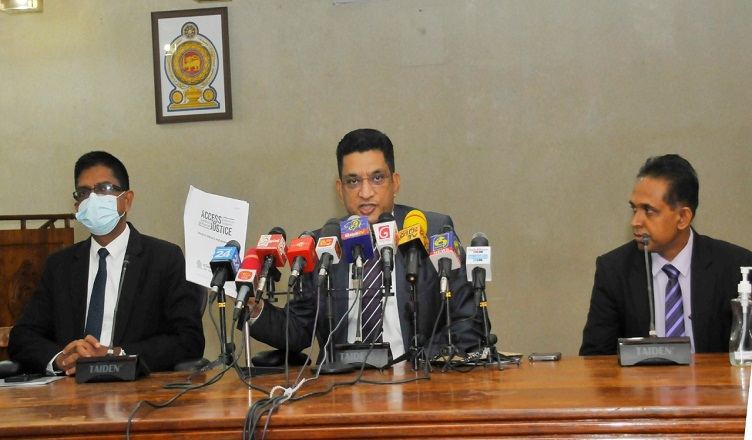.jpg)
Sri Lankan police officers have pushed back protesting Tamil mothers in Vavuniya today, as they demanded justice for their forcibly disappeared loved ones outside a justice ministry meeting in the city.
.jpg)
At least one woman fainted at the scene, as officers surrounded the women earlier this morning.
.jpg)
.jpg)
The relatives had gathered outside the Vavuniya District Secretariat as the Sri Lankan justice ministry’s mobile service visited.
The mobile service was launched this month with a wide mandate, including a focus on “investigating complaints on missing persons”.

Speaking at a press conference, Sri Lanka’s Justice Minister Ali Sabry said the initiative was part of a move by the government to deflect growing international pressure over accountability for atrocities committed during the armed conflict.
“It is strength to face the challenges posed by the international community and that having a strong local mechanism for the problems in the country is a good message to the international community as well,” he told reporters.
According to the Daily News, he added that the “main focus was on the issue of missing persons during the civil war and if there had any injustice to the families of the missing persons, they hoped to issue a death certificate or compensation to them”.
“It appears that this is an effort to give the appearance that action is being taken without tackling the structural, systemic and political obstacles to access to and obtaining justice,” said Ambika Satkunanathan, a former commissioner of the Human Rights Commission of Sri Lanka. “While such mobile services are good means of taking state services to communities that may be isolated and have difficulties accessing state institutions or do not know of the remedies available, it cannot for instance provide remedies to the families of the disappeared unless the mobile services plans to update the families about the process of investigations.”
The issuing of death certificates however has had a history of opposition from Tamils, who continue to search for their loved ones, highlighted Satkunanathan on Twitter earlier today. Many fear that accepting so will mean that the Sri Lankan state will deny they were forcibly disappeared or abducted in the first place.
“Some are even afraid to apply for Certificates of Absence as they’re afraid it might be used to deny disappearance took place or discredit their accountability demands,” she added.
The program has already come under criticism (see here and here), just days after it was launched.
.jpg)
The Tamil women who gathered in Vavuniya made clear their demands.
The demonstrators, who held photographs of their disappeared loved ones and placards demanding justice, repeated their calls for accountability rather than accepting monetary handouts from the Sri Lankan government.
Many wept as they argued with the Sri Lankan police officers, who continued to push them back away from the venue for hours.
They all demanded to know what had happened to their loved ones.
.jpg)
.jpg)
“That the government refuses these families the truth and justice they deserve is bad enough, but on top of that the police as evident here show them no empathy, failing even the basics of humanity,” tweeted Dharsha Jegatheeswaran, co-director at the Jaffna-based Adayaalam Centre for Policy Research.
“How anyone meets these families and feels anything but heartbroken is beyond me.”
See more photographs from Vavuniya below.
.jpg)
.jpg)
.jpg)
.jpg)
